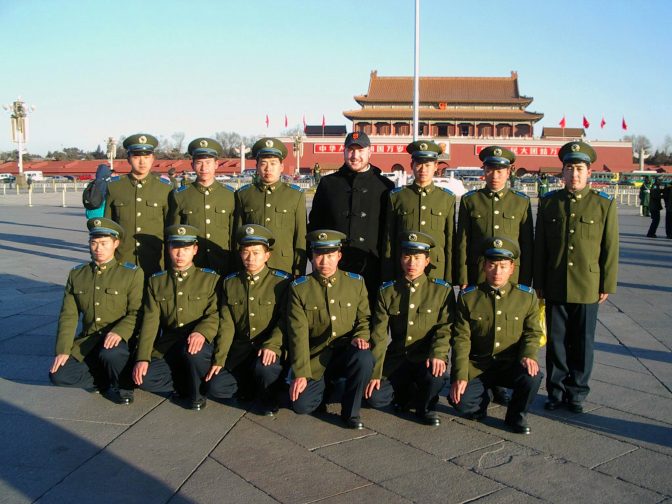Mafen Madness: Busted for Cannabis in China

“The package is going to be here tomorrow, for sure,” Michael Manning told his friends one night in Beijing in 2009. The American expat was playing a game of pool before heading off to the night shift at his job at a TV station. “At this time tomorrow, we’ll be smoking a lot of hash, or I’ll be in jail!” he joked.
It was not the first time Manning (above in photo with the PLA Air Force) had shipped hash from Xinjiang, a semiautonomous region in northwest China. The area has become known as China’s troubled Muslim region, where protests turn violent and government crackdowns target Uyghurs, the Muslim ethnic minority, for “separatist terrorism.” But the area, which shares borders with Kazakhstan, India and Tibet, is also known for its hash.
Manning had spent three years (2005–2008) teaching English in Korla, a city of about 400,000 in the desert of central Xinjiang. In his time there, he befriended local Uyghurs who hooked him up with the hash. But after years of living in a small city with few options for entertainment and even fewer Western goods, Manning decided to move to Beijing in 2008. He brought a softball-size chunk of hash with him.
One of the first places he went was the 2 Kolegas, a now-defunct bar and music venue in Beijing that, six years later, in 2014, was the site of a drug raid; before then, authorities didn’t randomly drug-test people who were out on the town. Manning would light up at 2 Kolegas, where he met friends who wanted a puff.

“Oh my god, where’d you get this hash?” people would ask. “This is a million times better than what we get.” Indeed, the hash sold on the streets of Beijing was pressed—a dark, brownish color or the black, sticky variety—and less potent. The hash Manning got from his Uyghur buddies was clean, blond and smelled like flowers.
“Let me buy some,” his friends would offer, and he would oblige. “I had plenty,” Manning tells Freedom Leaf.
Manning started arranging bigger buys from his Uyghur connection. “I’d bring it back to Beijing, and everyone was loving it,” he recalls. It’s not that Manning needed the money; he had a plum job at CCTV-9, the documentary channel of China’s state broadcaster.
But eventually, Manning’s connection stopped responding to texts and calls, so he decided to fly to Korla, where he bought two kilos of hash from a man in a Uyghur village. Manning had it shipped to Beijing in a set of computer speakers with the hash hidden in the subwoofer.
The Ancient Chinese Stash
About a four-hour drive northeast of Korla lies Turpan, home to an ancient cemetery, the Yanghai Tombs. In 2008, archeologists excavating the site discovered 789 grams of cannabis in the 2,700-year-old grave of a shaman.
While researchers have long known that ancient peoples used industrial hemp, this discovery suggested they also got high. Their tests showed the plant matter contained significant levels of THC, CBD and other cannabinoids. A genetic analysis concluded that the plant material was cultivated, not found in the wild. “The cannabis was presumably employed by this culture as a medicinal or psychoactive agent, or an aid to divination,” Ethan Russo and his team wrote in the Journal of Experimental Botany.

Prior to this important finding, most cannabis research in China had focused on hemp, which was used to make everything from rope to shoes to clothes. Hemp cultivation in China dates back to the Western Zhou period, 1046 BC to 771 BC, and it eventually became a widely grown crop for that agricultural society—a hardy plant that supplied sturdy fibers from its stalks and nutritious oil from its seeds. Peasants submerged bundles of hemp stalks in water to separate the fibers from the stems; the retting water would then be used as an insecticide.
Hemp was also used to make mourning robes, created according to tradition. When mourning the death of grandparents or great-grandparents, people wore robes made of the thin fibers of male hemp plants; when mourning the death of parents, robes made of female hemp plants were worn. Normally used for making rope, female plants produce courser fabric, which was intended to indicate the distress of the mourner.
What About Getting High?
While hemp and marijuana have a long, storied history in China, there’s little information about its psychoactive uses. While recent science supports the theory that the plant was used to pursue altered states, few specifics are known.
Many point to Shennong as the first to write about cannabis as medicine in early China. “Shennong’s Materia Medica is from the Eastern Han Dynasty, and is only pseudonymously written by Shennong,” Jiakui Wang, professor at the Chengdu University of Traditional Chinese Medicine, informs Freedom Leaf. “To say that Shennong was the first person in China to record the medical uses of cannabis is not accurate.”
But the Shennong’s Materia Medica text contains many references to the psychoactivity of cannabis and other plants, such as, “Consuming a lot of mafen [cannabis flowers] makes people see ghosts and run wild.”
Wang further explains: “What [the writer] describes probably refers to medicating with mafen that had THC, which produced hallucinations and other psychoactive effects. Shennong’s Materia Medica not only brought up mafen’s psychoactive properties, but also mentions the poisonous, hallucinogenic black henbane. These entries all refer to the psychoactive effects of medicines, so it can be said that people in those times had an understanding of the psychoactivity of certain medicines.”
Early populations in China may have incorporated the mind-altering effects of some plants in treatments, but “the medical books that came after Shennong’s Materia Medica rarely used these ‘people running wild’ psychoactive effects to talk about treating illnesses,” Wang adds.
While ethnic minority groups like the Uyghurs and Hui (another Muslim population in Xinjiang) have long traditions of using psychoactive cannabis, the Han (China’s majority ethnic group) have historically turned to opium as their drug of choice.
Many blame Great Britain for introducing opium to China, but it actually appeared in the early 18th century, well over 100 years before the Opium Wars. High-quality opium from India fueled the rise of wealthy connoisseurs, who developed complex rituals and fancy smoking utensils for consuming it. Foreign visitors were surprised by the absence of “dope fiends” in opium houses; the Boston Medical and Surgical Journal described one foreigner’s visit to a clean and bright opium den as like “the little intimate beerhouse of Berlin where the tired working men could go in the evening and spend a peaceful hour.”
China’s War on Drugs
When Michael Manning’s two-kilo package arrived in Beijing in March 2009, a dozen or so police officers stormed his apartment. A lab report determined the package contained 1,992 grams of hash—eight grams shy of a distribution charge. Chinese law doesn’t have a charge for possession with intent to distribute, and getting caught with more than 2,000 grams of cannabis means an automatic distribution charge. Those suspected of such crimes can be held in jail for up to seven months and seven days while a case is being built against them.
 Manning (at right) was sent to Beijing’s No. 1 Detention Center—home to the city’s worst offenders (“psychos, murderers, cannibals and weirdos”), white-collar criminals (“Bernie Madoff types, scam artists and financial people who swindled companies”) and foreigners. Day-to-day existence was “boring, and the rules were strict,” Manning wrote in a letter published at Danwai.org shortly after his release. “No torture, not rape in the shower, just good ol’ psychological torture of close confinement from everyone and everything I ever had known one millisecond before I was taken into custody.”
Manning (at right) was sent to Beijing’s No. 1 Detention Center—home to the city’s worst offenders (“psychos, murderers, cannibals and weirdos”), white-collar criminals (“Bernie Madoff types, scam artists and financial people who swindled companies”) and foreigners. Day-to-day existence was “boring, and the rules were strict,” Manning wrote in a letter published at Danwai.org shortly after his release. “No torture, not rape in the shower, just good ol’ psychological torture of close confinement from everyone and everything I ever had known one millisecond before I was taken into custody.”
While China’s laws against harder drugs like heroin, methamphetamine and MDMA are pretty clear, the laws surrounding cannabis are a bit murkier. “I believe the unofficial Chinese government policy is to not bother the Uyghurs about smoking hash, except for when it suits them,” Manning says. “I’m sure they use it as a pretext or something in regards to terrorism. But people aren’t getting arrested smoking hash in Uyghur villages.”
As far as his bust, Manning observes: “It’s pretty awful to get arrested in a foreign country, especially one where you don’t have any rights. China has a 99.9% conviction rate, so it’s not like you have much hope.”
Despite China’s long history with various psychoactive substances, the government today maintains a strong prohibitionist stance. The country still has the death penalty for some drug trafficking crimes.In 2008, they executed three drug offenders “to mark International Day Against Drug Abuse and Illicit Trafficking,” according to Reuters, and in 2014, Jackie Chan’s son, Jaycee, spent six months in jail on a marijuana charge.
On an October day in 2009, seven months after Manning was dispatched to Beijing’s No. 1 Detention Center, a voice came over the loudspeaker while he was eating lunch. “Jinggubang!”—Manning’s Chinese name—the voice barked. “Gather your things!”
“What do they want me to do?” Manning wondered. “What’s going on?”
“I can’t believe it,” exclaimed one of his prison friends. “You’re going home!” His cellmates slapped him on the back and scrambled to write messages to their wives for him to smuggle out.
“I was laughing and feeling awesome and uncontrollably blubbering and crying all at the same time,” he says about that moment.
Chinese authorities promptly deported Manning back to America.
If you enjoyed this Freedom Leaf article, subscribe to the magazine today!

